
Research
Malicious npm Packages Impersonate Flashbots SDKs, Targeting Ethereum Wallet Credentials
Four npm packages disguised as cryptographic tools steal developer credentials and send them to attacker-controlled Telegram infrastructure.
@stdlib/stdlib
Advanced tools
@stdlib/stdlib is a comprehensive standard library for JavaScript and Node.js, providing a wide range of utilities for scientific computing, data analysis, and general-purpose programming.
Mathematical Functions
The package provides a variety of mathematical functions, such as trigonometric, exponential, and logarithmic functions. This example demonstrates the use of the sine function.
const stdlib = require('@stdlib/stdlib');
const sin = stdlib.math.base.special.sin;
console.log(sin(Math.PI / 2)); // 1Statistical Functions
@stdlib/stdlib includes statistical functions for data analysis, such as mean, median, and standard deviation. This example calculates the mean of an array of numbers.
const stdlib = require('@stdlib/stdlib');
const mean = stdlib.stats.base.mean;
console.log(mean([1, 2, 3, 4, 5])); // 3Random Number Generation
The package offers random number generation utilities, supporting various distributions. This example generates a random number between 0 and 1.
const stdlib = require('@stdlib/stdlib');
const randu = stdlib.random.base.randu;
console.log(randu()); // Random number between 0 and 1Data Structures
@stdlib/stdlib provides data structures like arrays and matrices, which are essential for handling and manipulating data efficiently. This example shows how to create an array.
const stdlib = require('@stdlib/stdlib');
const array = stdlib.array.array;
const arr = array([1, 2, 3]);
console.log(arr); // [1, 2, 3]Math.js is an extensive math library for JavaScript and Node.js, similar to @stdlib/stdlib in providing a wide range of mathematical functions. However, math.js focuses more on symbolic computation and unit conversion, whereas @stdlib/stdlib offers a broader range of utilities including statistical and random number functions.
Lodash is a popular utility library for JavaScript, offering functions for common programming tasks such as manipulating arrays and objects. While lodash is more focused on general-purpose utilities, @stdlib/stdlib provides specialized functions for scientific and statistical computing.
Numeric.js is a library for numerical computations in JavaScript, providing matrix operations and numerical algorithms. It is similar to @stdlib/stdlib in its focus on numerical computing, but @stdlib/stdlib offers a wider range of statistical and random number generation functions.
We believe in a future in which the web is a preferred environment for numerical computation. To help realize this future, we've built stdlib.
stdlib (/ˈstændərd lɪb/ "standard lib") is a standard library with an emphasis on numerical and scientific computation, written in JavaScript (and C) for execution in browsers and in Node.js. The library provides a collection of robust, high performance libraries for mathematics, statistics, data processing, streams, and more and includes many of the utilities you would expect from a standard library.
What sets stdlib apart is its fully decomposable architecture, which allows you to swap out and mix and match APIs and functionality to cater to your exact preferences and use cases.
When you use stdlib, you can be confident that you are using the most thorough, rigorous, well-written, studied, documented, tested, measured, and high-quality code available.
Want to join us in bringing numerical computing to the web? Start by starring the project. :star2:
Explore this GitHub repository for stdlib's source code and documentation. For guidance on developing stdlib, refer to the development guide.
Thank you for being a part of our community! Your support is invaluable to us!
150+ special math functions.
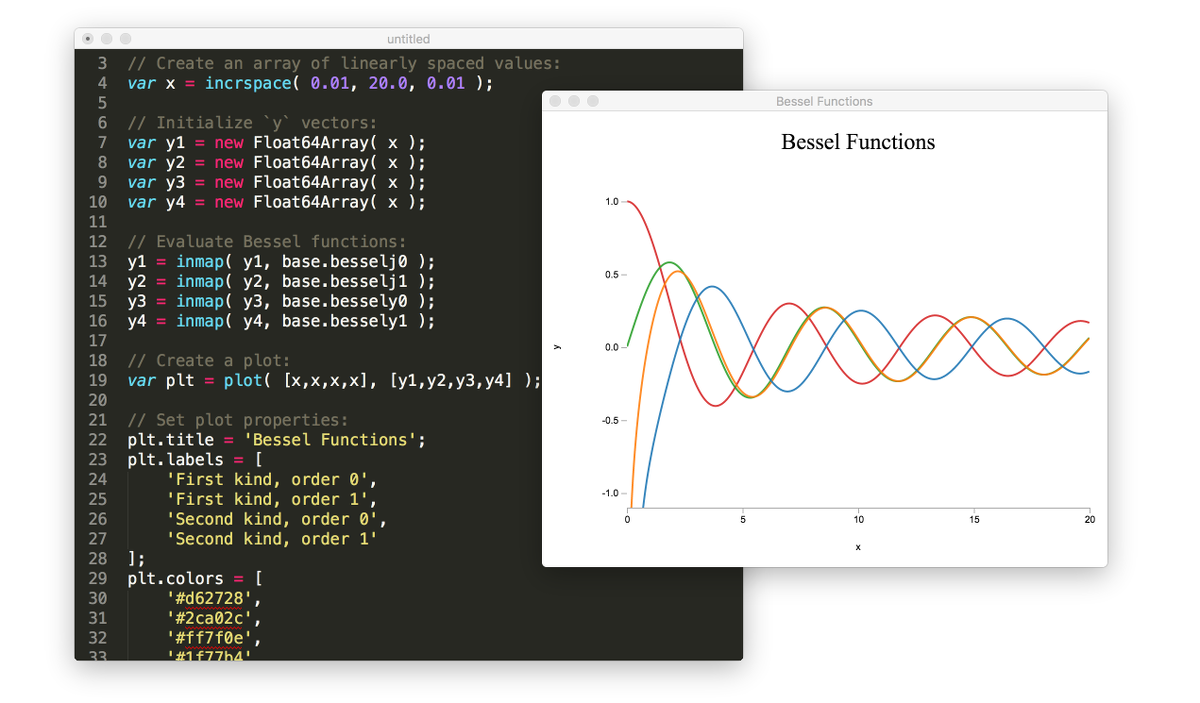
35+ probability distributions, with support for evaluating probability density functions (PDFs), cumulative distribution functions (CDFs), quantiles, moments, and more.
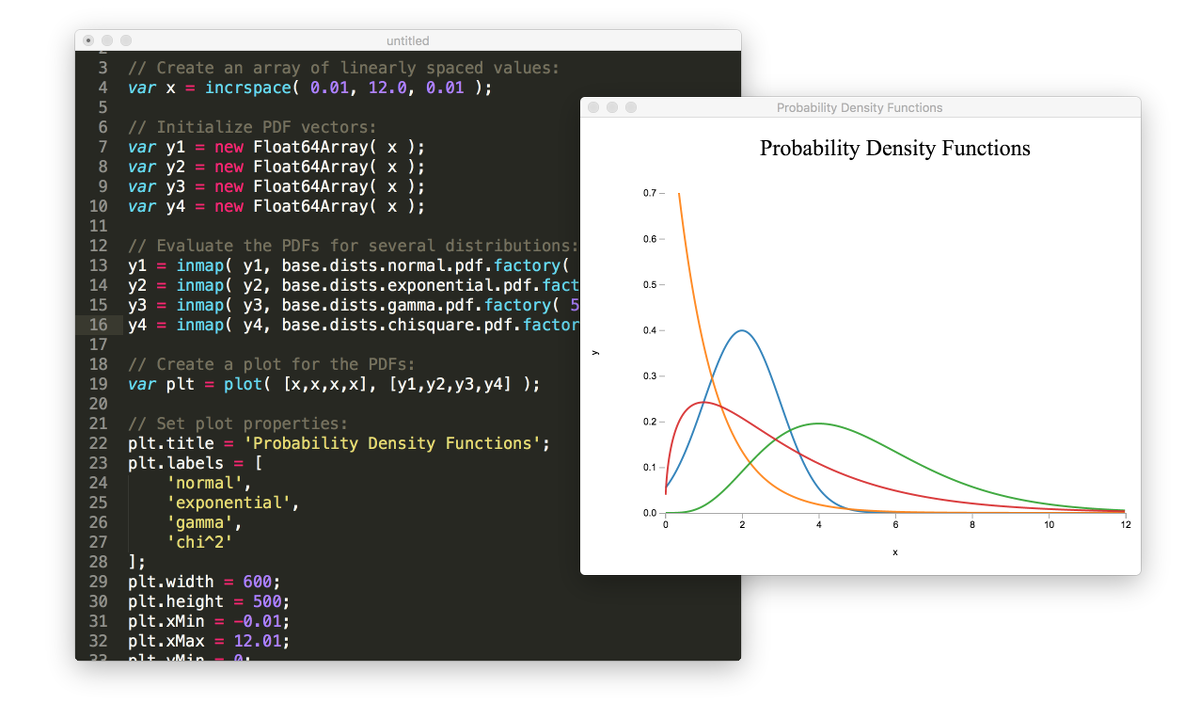
40+ seedable pseudorandom number generators (PRNGs).
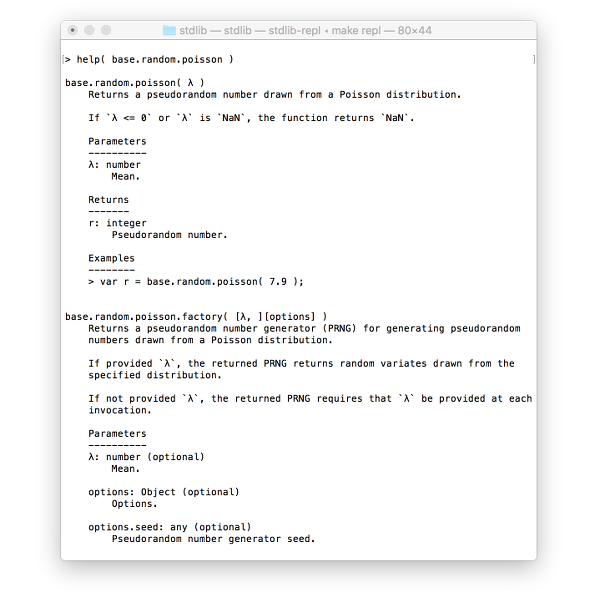
200+ general utilities for data transformation, functional programming, and asynchronous control flow.
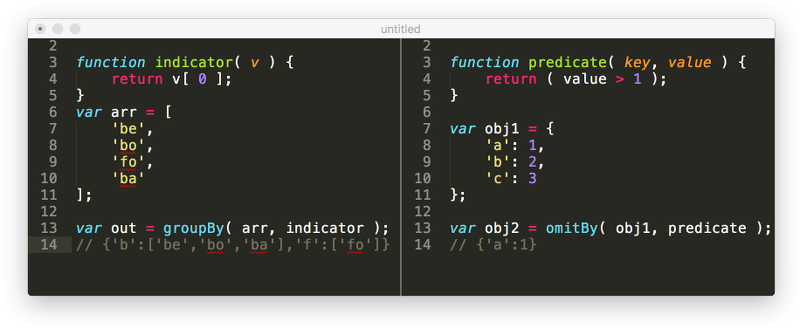
200+ assertion utilities for data validation and feature detection.
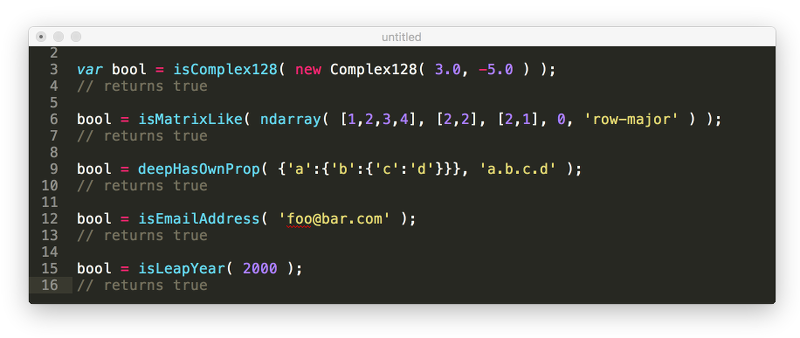
50+ sample datasets for testing and development.
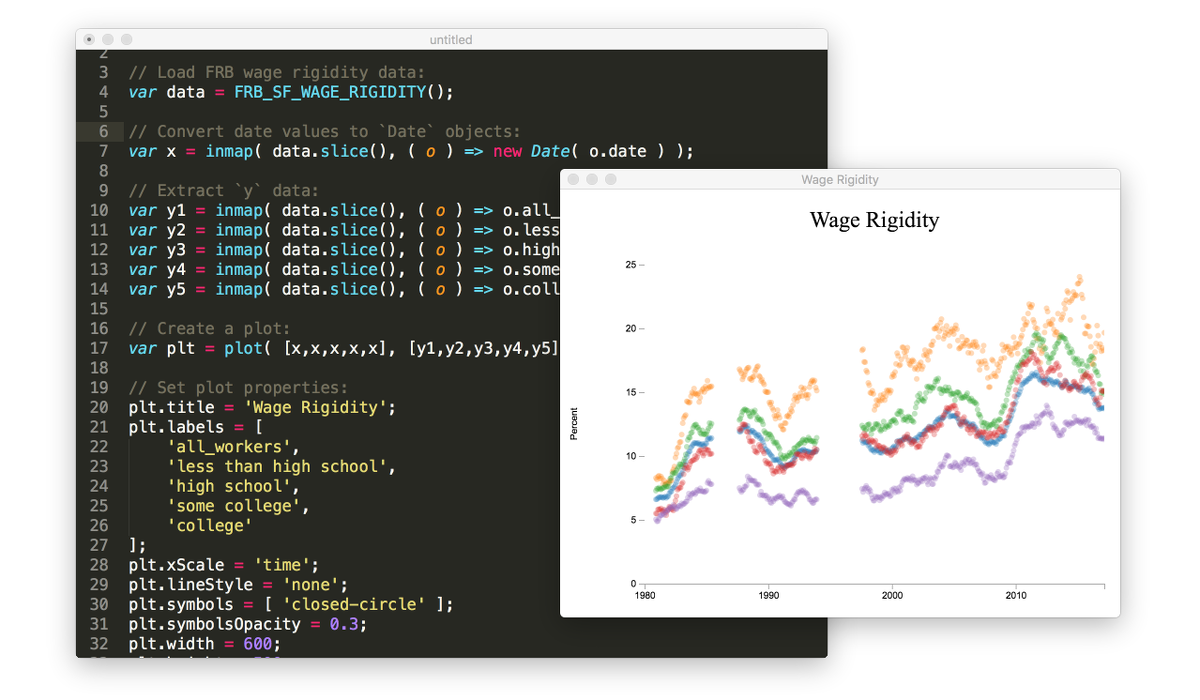
A plot API for data visualization and exploratory data analysis.

Native add-ons for interfacing with BLAS libraries, with pure JavaScript fallbacks.
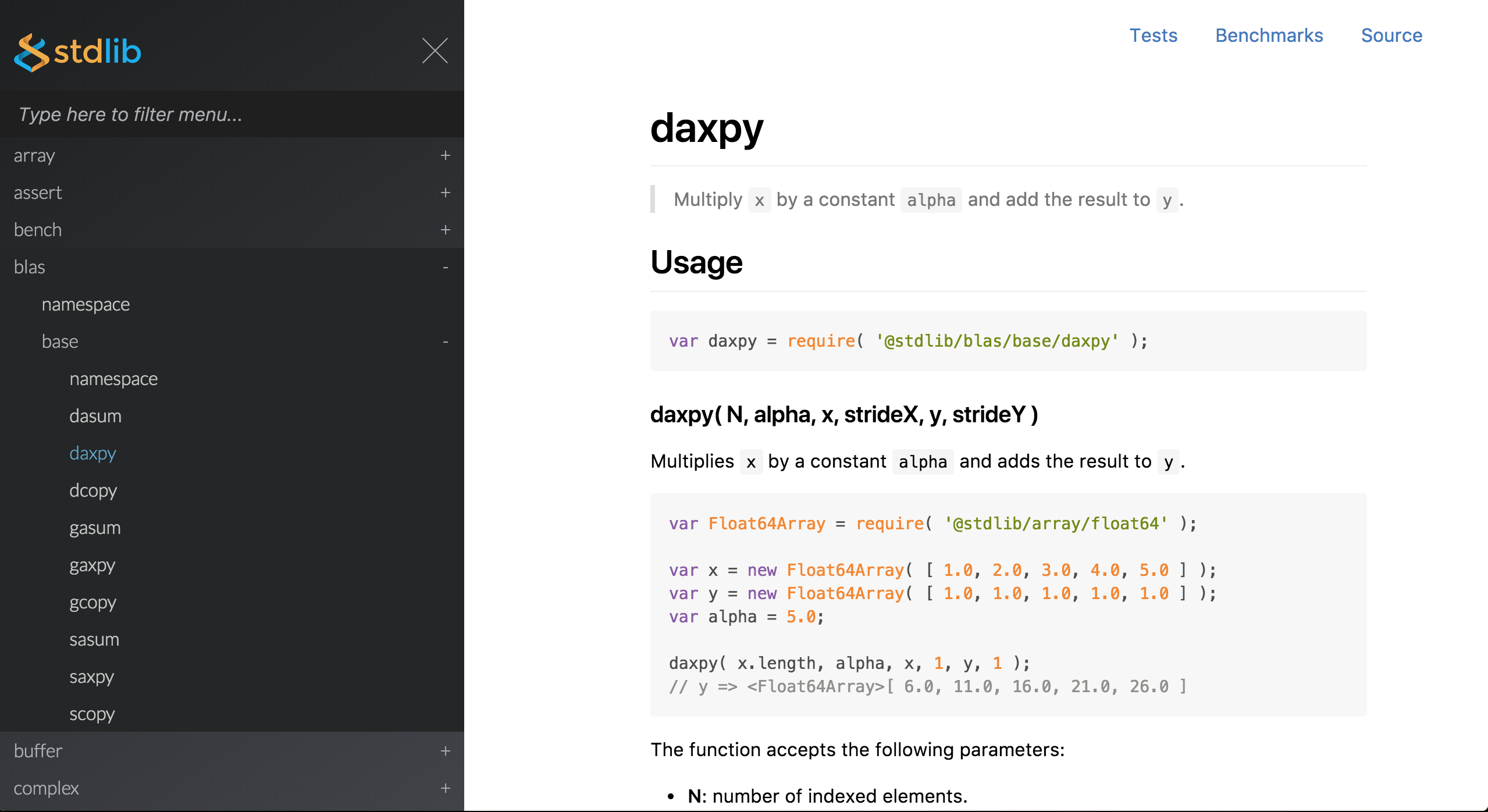
A benchmark framework supporting TAP.
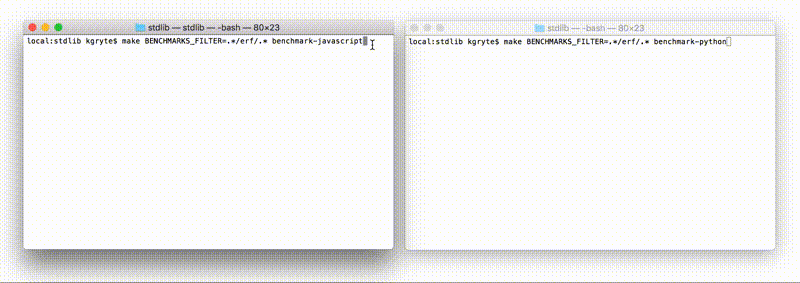
REPL environment with integrated help and examples.
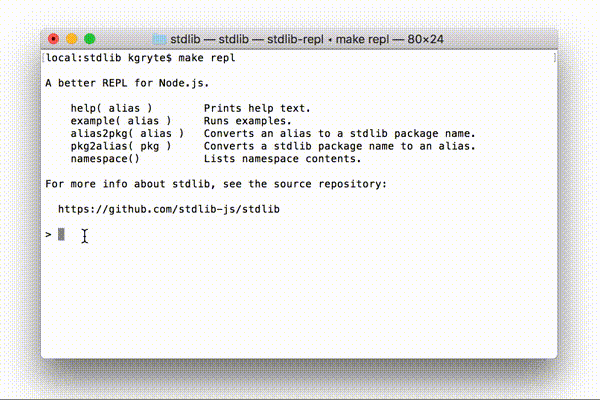
Can be bundled using Browserify, Webpack, and other bundlers for use in web browsers.
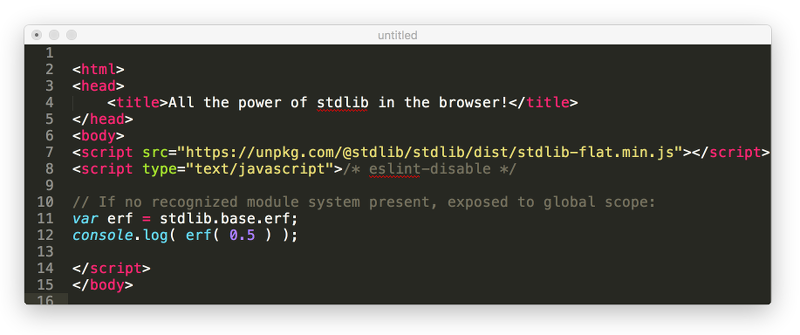
Every function is accompanied by TypeScript declaration files, ensuring type safety and facilitating intelligent code completion in IDEs.

To accommodate various use cases, stdlib can be used in multiple ways. The preferred method of use depends on your individual use case. We've provided some user stories to help you identify the best approach. 😃
While this project's installation instructions defaults to using npm for package management, installation via other package managers, such as yarn, should be a matter of simply swapping out npm commands with those of the relevant package manager.
I want to perform data analysis and data science tasks in JavaScript and Node.js, similar to how I might use Python, Julia, R, and MATLAB.
I am building a web application.
I plan on using Browserify, Webpack, and other bundlers for use in web browsers.
I would like to vendor a custom bundle containing various stdlib functionality.
I would like to include stdlib functionality by just using a script tag.
I would like to use ES Modules.
I would like to use a pre-built bundle (possibly via a CDN, such as unpkg or jsDelivr).
I am interested in using a substantial amount of functionality found in a top-level stdlib namespace and don't want to separately install hundreds of individual packages (e.g., if building an on-line calculator application and wanting all of stdlib's math functionality).
Install one or more top-level namespaces. Installing the entire project is likely unnecessary and will lead to slower installation times. Installing a top-level namespace is likely to mean installing functionality which will never be used; however, installing a top-level namespace is likely to be easier and less time-consuming than installing many individual packages separately.
When bundling, installing a top-level namespace should not be a concern, as individual functionality can still be independently required/imported. Project installation times may, however, be somewhat slower.
I am building a Node.js server application.
I am interested in using various functionality found in stdlib.
I would like to vendor stdlib functionality and avoid dependency trees.
I am interested in using a substantial amount of functionality found in a top-level stdlib namespace and don't want to separately install hundreds of individual packages.
I am using Deno.
I would like to use stdlib functionality in an Observable notebook.
I want to hack at stdlib, possibly even creating customized builds to link to platform-specific native libraries (such as Intel's MKL or some other numerical library).
To install the entire project as a library or application dependency,
$ npm install @stdlib/stdlib
Once installed, stdlib packages can be individually required/imported to minimize load times and decrease bundle sizes. For example, to use require
var ndarray = require( '@stdlib/ndarray/array' );
var arr = ndarray( [ [ 1, 2 ], [ 3, 4 ] ] );
// returns <ndarray>
and to use import
import ndarray from '@stdlib/ndarray/array';
var arr = ndarray( [ [ 1, 2 ], [ 3, 4 ] ] );
// returns <ndarray>
stdlib is designed to allow decomposition of the main project into individual packages which can be independently consumed. Accordingly, users of the project can avoid installing all project functionality and only install the exact functionality they need.
To install individual packages, replace forward slashes / after @stdlib/ with hyphens -. For example,
$ npm install @stdlib/ndarray-array
Once installed, individual packages can be required/imported. For example, to use require
var ndarray = require( '@stdlib/ndarray-array' );
var arr = ndarray( [ [ 1, 2 ], [ 3, 4 ] ] );
// returns <ndarray>
and to use import
import ndarray from '@stdlib/ndarray-array';
var arr = ndarray( [ [ 1, 2 ], [ 3, 4 ] ] );
// returns <ndarray>
stdlib is comprised of various top-level namespaces (i.e., collections of related functionality united by common themes). For example, to install all math functionality found in the top-level math namespace,
$ npm install @stdlib/math
Once installed, packages within a top-level namespace can be individually required/imported to minimize load times and decrease bundle sizes. For example, to use require
var sin = require( '@stdlib/math/base/special/sin' );
var v = sin( 3.14 );
// returns <number>
and to use import
import sin from '@stdlib/math/base/special/sin';
var v = sin( 3.14 );
// returns <number>
Note: installing nested namespaces found within top-level namespaces (e.g., math/base) is not supported. Consider installing individual packages or the relevant top-level namespace.
To install globally for use as a command-line utility and/or use the REPL,
$ npm install -g @stdlib/stdlib
which will expose the stdlib command. For example, to see available sub-commands
$ stdlib help
and to run the REPL
$ stdlib repl
To use ES Modules via a <script> tag, use ES Module builds available in each package's repository via a dedicated esm branch (e.g., see the esm branch for @stdlib/math-base-special-erf). For example,
<script type="module">
import linspace from 'https://cdn.jsdelivr.net/gh/stdlib-js/array-base-linspace@esm/index.mjs';
import erf from 'https://cdn.jsdelivr.net/gh/stdlib-js/math-base-special-erf@esm/index.mjs';
const x = linspace( -10.0, 10.0, 100 );
for ( let i = 0; i < x.length; i++ ) {
console.log( 'x: %d, erf(x): %d', x[ i ], erf( x[ i ] ) );
}
</script>
To use individual packages in Deno, use Deno builds available in each package's repository via a dedicated deno branch (e.g., see the deno branch for @stdlib/ndarray-array). For example,
import ndarray from 'https://cdn.jsdelivr.net/gh/stdlib-js/ndarray-array@deno/mod.js';
var arr = ndarray( [ [ 1, 2 ], [ 3, 4 ] ] );
// returns <ndarray>
For those wanting a jQuery-like bundle, one can use pre-built distributable UMD bundles for use in browser environments or as shared ("vendored") libraries in server environments available in each package's repository via a dedicated umd branch. See sections UMD and Node.js for more details.
To use UMD bundles either via a <script> tag or in Observable, use UMD browser builds available in each package's repository via a dedicated umd branch (e.g., see the umd branch for @stdlib/math-base-special-erf). For example,
<script type="text/javascript" src="https://cdn.jsdelivr.net/gh/stdlib-js/array-base-linspace@umd/browser.js"></script>
<script type="text/javascript" src="https://cdn.jsdelivr.net/gh/stdlib-js/math-base-special-erf@umd/browser.js"></script>
<script type="text/javascript">
(function () {
var x = linspace( -10.0, 10.0, 100 );
for ( var i = 0; i < x.length; i++ ) {
console.log( 'x: %d, erf(x): %d', x[ i ], erf( x[ i ] ) );
}
})();
</script>
To vendor stdlib functionality and avoid installing dependency trees, use UMD server builds available in each package's repository via a dedicated umd branch (e.g., see the umd branch for @stdlib/math-base-special-erf). For example,
var linspace = require( '/path/to/vendor/umd/@stdlib/array-base-linspace' );
var erf = require( '/path/to/vendor/umd/@stdlib/math-base-special-erf' );
var x = linspace( -10.0, 10.0, 100 );
for ( var i = 0; i < x.length; i++ ) {
console.log( 'x: %d, erf(x): %d', x[ i ], erf( x[ i ] ) );
}
To create a custom bundle based on project needs,
follow the download, configuration, and installation instructions as described in the development guide.
navigate to the local installation directory.
run the following command to print help documentation for providing a list of stdlib package names to bundle
$ NODE_PATH=./lib/node_modules node ./bin/cli bundle-pkg-list -- -h
modify and run the above command with the list of packages to bundle
$ NODE_PATH=./lib/node_modules node ./bin/cli bundle-pkg-list -- <pkg> <pkg> <pkg> ...
Upon generating a bundle, the bundle can be loaded via a <script> tag as described above for pre-built distributable UMD bundles.
To install as a system library (e.g., for the purposes of creating custom builds), follow the download, configuration, and installation instructions as described in the development guide.
Installing and running stdlib for use in Node.js requires the following prerequisites:
>= 0.10)> 2.7.0; if Node < 1.0.0, version > 2.7.0 and < 4.0.0; if Node <= 10.x.x, version > 2.7.0 and < 6.0.0)Most functionality in stdlib is implemented in JavaScript and no further prerequisites are required to use stdlib (i.e., you can safely avoid installing any additional prerequisites); however, some implementations try to capture performance benefits by using native bindings and/or WebAssembly. While not required to run stdlib, as every stdlib implementation has a JavaScript fallback, the following dependencies are required for building native add-ons, including linking to BLAS and LAPACK libraries:
>= 4.8; clang version >= 3.5, Xcode version >=8.3.1 on OS X)>= 4.8)While not required to run stdlib, the following dependencies are required for automatically downloading external libraries:
The following external libraries can be automatically downloaded and compiled from source using make:
First time contributor?
Already an expert?
Fork the repository.
Clone the forked repository
$ git clone --depth=1 https://github.com/<username>/stdlib.git
where <username> is your GitHub username.
Navigate to the stdlib directory
$ cd stdlib
Install dependencies
$ make install-node-modules
Initialize your stdlib development environment
$ make init
stdlib development is generously supported by the following sponsors:
Are you interested in supporting stdlib? If so, join our Open Collective!
The following organizations and key stakeholders trust and rely on stdlib:
Does your organization use stdlib? If so, we'd love to hear from you!
For information about the governance of the stdlib project, see GOVERNANCE.md.
See LICENSE.
Copyright © 2016-2024. The Stdlib Authors.
FAQs
Standard library.
The npm package @stdlib/stdlib receives a total of 47,085 weekly downloads. As such, @stdlib/stdlib popularity was classified as popular.
We found that @stdlib/stdlib demonstrated a healthy version release cadence and project activity because the last version was released less than a year ago. It has 4 open source maintainers collaborating on the project.
Did you know?

Socket for GitHub automatically highlights issues in each pull request and monitors the health of all your open source dependencies. Discover the contents of your packages and block harmful activity before you install or update your dependencies.

Research
Four npm packages disguised as cryptographic tools steal developer credentials and send them to attacker-controlled Telegram infrastructure.

Security News
Ruby maintainers from Bundler and rbenv teams are building rv to bring Python uv's speed and unified tooling approach to Ruby development.

Security News
Following last week’s supply chain attack, Nx published findings on the GitHub Actions exploit and moved npm publishing to Trusted Publishers.